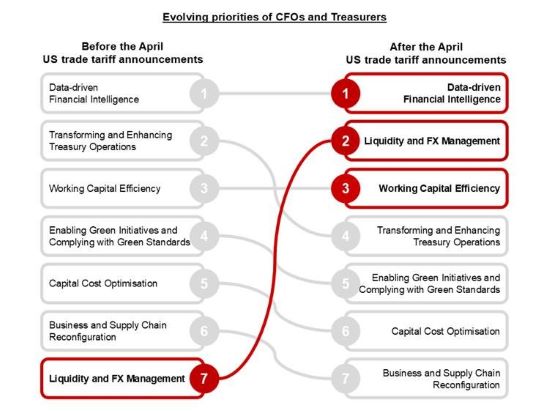A new DBS report entitled New Realities, New Possibilities reveals that businesses are recalibrating their long-term strategies to strengthen financial resilience over the next five years. This includes a greater emphasis on liquidity and foreign exchange (FX) management and data-driven financial intelligence to enable better organisational performance.
The bank gathered insights from over 800 finance leaders, including chief financial officers and corporate treasurers, across seven sectors and 14 markets[1] for the report. To better understand how finance leaders were steering their organisations amidst immediate-term developments, respondents were surveyed in two batches – before and after the US trade tariff announcements in April.
Findings showed that leveraging data-driven financial intelligence to strengthen decision-making remained a top priority for companies over the next five years (Figure 1), with respondents drawn to data visualisation and security monitoring tools to enhance treasury and finance functions. These tools help leaders navigate uncertainty more effectively with sharper sense-making and better threat anticipation, enabling more accurate cash flow forecasting and proactive capital strategies.
Notably, liquidity and foreign exchange (FX) management leapt from seventh place to second. This comes as companies start planning to strengthen financial stability amidst higher upfront costs and potential inventory stockpiling associated with increased market volatility. To do so effectively, over one-in-two said they were exploring more innovative solutions including integrated payments, blockchain-powered capabilities and the setting up of regional treasury centres.
Strengthening working capital efficiency rounded up the list of top three priorities as companies recognised the need to optimise financial returns while enhancing financial flexibility. Some 69% said they are exploring Gen AI-powered solutions to optimise inventory forecasting, overcome prolonged receivables collection periods and improve cash conversion cycles.
Figure 1
Transformation, cost optimisation and sustainability remain ongoing priorities
Amid an increasingly complex business landscape, companies are seeking to enhance agility, strengthen operational resilience and advance sustainability.
About 50% of finance leaders said supply chain reconfiguration continued to be a priority to diversify and strengthen their manufacturing footprint to be closer to customers. A similar proportion planned to review their capital costs by optimising the mix of equity and debt financing. One-in-two companies indicated that trade finance solutions and cross-border payment methods were key strategies for supporting their transformation agendas.
In addition, enabling green initiatives and ensuring compliance with sustainability standards remained a priority for half of respondents. Companies said they were considering various approaches to advance sustainability, including using digital tools to enhance the rigour of ESG reporting (77% of respondents), partnerships with ESG ecosystem networks (64%) and sustainable trade finance solutions (63%).
Han Kwee Juan, Group Head of Institutional Banking at DBS, said: “We are entering a new norm marked by greater uncertainty and an accelerating pace of technological transformation. For businesses, navigating the path to resilience lies in proactive adaptation across several key dimensions, including strengthening data driven decision-making, optimising liquidity and working capital, diversifying supply chains and building new technology capabilities. These enable businesses to not just tide through immediate challenges but to achieve long-term competitive advantage.”
Lim Soon Chong, Group Head of Global Transaction Services at DBS, said: “As stewards of capital and risk management, treasury and finance teams have never been more critical in providing strategic leadership within their organisations. They are stepping up to help navigate fast-changing conditions, build resilience and drive sustainable value creation. To future-proof themselves in a changed world, finance leaders are turning to strategic partners for in-depth insights and a broad suite of solutions. As a leading transaction bank in Asia, DBS has been leveraging our capabilities and regional connectivity to support our clients as they navigate the challenges and opportunities that come with growth.”
New Realities, New Possibilities is the third iteration of DBS’ ongoing thought leadership series tailored for treasury and finance professionals, building on the findings of earlier reports. Each report aims to give finance leaders a deeper understanding of the evolving demands on treasury and finance teams and how companies might capture opportunities amid these shifts.
Read the full report here: go.dbs.com/NewRealitiesReport
[1] Sectors: Automotives, consumer products, energy and renewables, food and agribusiness, health and pharmaceuticals, industrials, technology. Markets: Australia, China, Europe, Hong Kong, India, Indonesia, Malaysia, Singapore, Taiwan, Thailand, USA, Vietnam
[END]
About DBS
DBS is a leading financial services group in Asia with a presence in 19 markets. Headquartered and listed in Singapore, DBS is in the three key Asian axes of growth: Greater China, Southeast Asia and South Asia. The bank’s “AA-” and “Aa1” credit ratings are among the highest in the world.
Recognised for its global leadership, DBS has been named “World’s Best Bank” by Global Finance, “World’s Best Bank” by Euromoney and “Global Bank of the Year” by The Banker. The bank is at the forefront of leveraging digital technology to shape the future of banking, having been named “World’s Best Digital Bank” by Euromoney and the world’s “Most Innovative in Digital Banking” by The Banker. In addition, DBS has been accorded the “Safest Bank in Asia“ award by Global Finance for 16 consecutive years from 2009 to 2024.
DBS provides a full range of services in consumer, SME and corporate banking. As a bank born and bred in Asia, DBS understands the intricacies of doing business in the region’s most dynamic markets.
DBS is committed to building lasting relationships with customers, as it banks the Asian way. Through the DBS Foundation, the bank creates impact beyond banking by supporting businesses for impact: enterprises with a double bottom-line of profit and social and/or environmental impact. DBS Foundation also gives back to society in various ways, including equipping underserved communities with future-ready skills and helping them to build food resilience.
With its extensive network of operations in Asia and emphasis on engaging and empowering its staff, DBS presents exciting career opportunities. For more information, please visit www.dbs.com.
